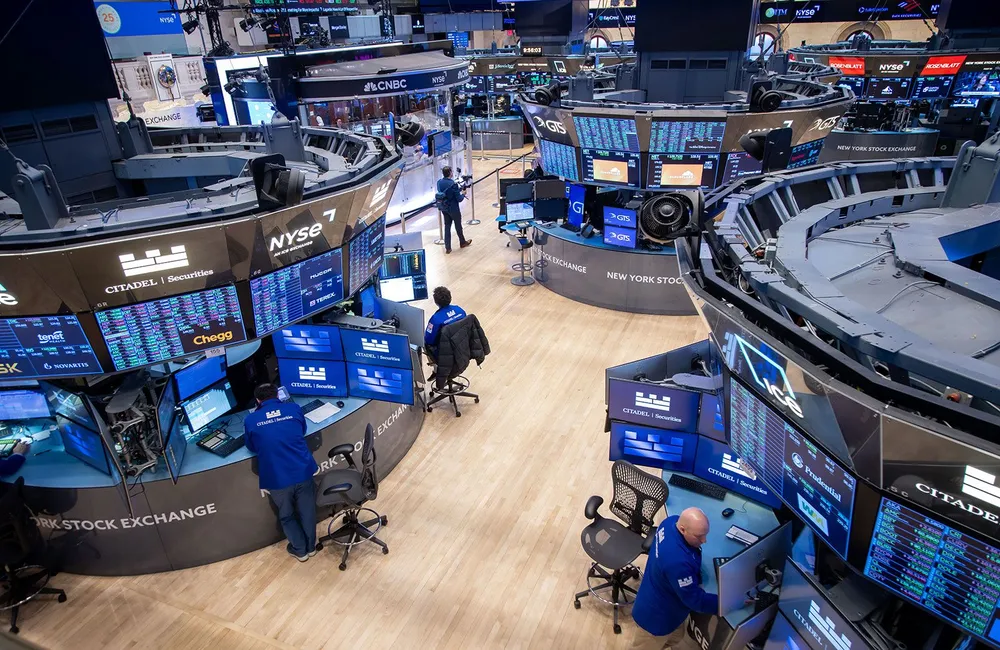ASX futures had fallen 135 points or 2.1% to 6325 by 8.00 am on Friday, suggesting a fresh selloff at the open.
Overseas, the S&P 500 was down 3.3 percent, wiping out gains from a relief rally yesterday. The Dow industrials fell 2.4%, slipping below the 30,000-point mark for the first time since January 2021. Both indexes closed at their lowest closing levels since December 2020. The tech-heavy Nasdaq Composite dropped 4.1%, its lowest closing point since September 2020.
Markets that were already nervous got further jabs on Thursday when the Bank of England and Swiss National Bank raised rates, a day after the US Federal Reserve unveiled its largest rate rise since 1994. The moves leave the Bank of Japan as the sole developed world central bank still waiting to hike rates.
“Anyone that was thinking about buying dips at least as far as closing below 30,000 could easily say, ‘You know what, I’m just going to sit this one out,’” said Carol Schleif, the deputy chief investment officer at BMO Family Office.
Back at home, the S&P/ASX 200 dropped 0.15 per cent to 6591.1 on Thursday, notching its longest losing streak since August.
The benchmark index was up 1.0% in early trade, apparently following US stocks that had risen after the Federal Reserve raised interest rates to curb inflation. But the ASX 200 stalled under weakness by financial stocks and ongoing economic concerns. It has lost 7.4% over five consecutive declines.
Shares in ANZ, Commonwealth and Westpac lost between 0.2% and 1.9%.
Health, utility and consumer staples were weak, too. Losses were trimmed by commodity stocks and a bounce for heavily sold-off shares of property trusts. The ASX 200 is down 4.9% thus far this week.
In commodities, Brent crude oil was up 1.1% to US$119.81 a barrel. Iron ore fell 1% to US$129.50. Gold gained 0.3% to US$1855.00.
Long end bond markets rallied Thursday with the Australian 2 Year government bond yield falling to 3.14% and the 10 Year to 3.99%. In the US, the yield on 2 year Treasury notes, which react more to interest rate policy, eased to 3.09% and the yield on the 10 year US Treasury notes slipped to 3.28% as concerns about recession rise.
The Australian dollar raced to 70.45 US cents, to 70.00 at the last close. The Wall Street Journal Dollar Index, which measures the US dollar against 16 others dipped to 96.41.
Asia
Chinese stocks finished mixed, losing among coal miners, financials and oil producers but gaining among pharma stocks. Property developers sank as the latest data on new-home prices reported a year-on-year decline in May beat April’s figures. China Vanke fell 0.9% and Poly Developments declined 1.8%. Insurers surrendered some of their big advances from yesterday, with Ping An down 2.4% and China Life Insurance 3.1% lower. PetroChina dipped 3.4% and miner China Shenhua Energy fell 3.9%. On the other hand, Shenzhen Mindray Bio-Medical and Chongqing Zhifei Biological Products gained over 1% each. The Shanghai Composite Index dropped 0.6% to 3285.38, while the Shenzhen Composite Index and ChiNext Price Index rose 0.4% apiece.
Hong Kong shares closed lower, with the market paring significant opening gains to finish weaker amid growing fears of more aggressive interest-rate increases by the US Fed. The benchmark Hang Seng Index dropped 2.2% to close at 20845.43. Sectors that dragged the index down were mixed: highest among them, shipping company Orient Overseas slumped 6.9% as analysts said the outlook for transportation demand across the trans-Pacific was worsening, due to flagging demand for goods in developed markets after peaking in 2021. Tech companies that are especially sensitive to higher rates were also hit, with Alibaba Health down 5.1% and Meituan losing 4.0%.
Japan’s Nikkei Stock Average gained 0.4% to close at 26431.20 on hopes that the Fed’s latest tightening won’t be as aggressive in the future, after the US central bank raised its policy rate by the largest amount since 1994 while indicating that similar size moves would not be the norm. As for why the market rallied after the Fed, it is that the market was way too ahead of itself in hawkish pricing and some of the hawkish bets have been trimmed, according to Swissquote Bank’s senior analyst Ipek Ozkardeskaya in an email. Broad-based gains on Nikkei included rises of 4.0% for Toray Industries, 3.0% for Asahi Group Holdings and 2.9% for Mitsubishi Heavy Industries.
Europe
European markets fell as recession fears rose after interest-rate hikes from central banks in Europe and the US. The pan-European Stoxx Europe 600 and French CAC 40 dropped more than 2 percent and the German DAX moved down 3 percent.
“European markets have been back doing their normal downside service again today after breaking a six-day streak of declines yesterday, after the Swiss National Bank unexpectedly raised rates by 50 basis points, following on from a 75 bps rate in the Federal Reserve last night, with the Bank of England following with another 25 bps,” writes Michael Hewson, an analyst at CMC Markets, adding that disappointing US housing industry data for May has “added to concerns we could be heading for an economic slowdown.”
London’s FTSE 100 index dropped 3.1 percent on Thursday after the Bank of England raised its interest rates by 25 basis points. What may have been most surprising was how much BOE’s response lacked punch, says Craig Erlam, senior market analyst for UK and EMEA at Oanda.
“At a time when the central bank expected inflation to peak higher than previously at above 11% in October, it also hiked interest rates by just 25 basis points and haven’t shown a particular readiness to accelerate tightening to tackle those price pressures,” Erlam writes in a research note. The bank clearly hopes inflation will fall back down over time, but that there is a big risk, he adds.
North America
US stocks fell sharply Thursday, driving the Dow Jones Industrial Average below 30000 for the first time since January 2021 as volatility continued to rattle the market.
The major indexes have posted large declines in 2022 amid high inflation, rising interest rates and increasing worries about corporate profits and economic growth sapping investors’ appetite for risk. The blue-chips are 18% lower this year, versus a 23% drop in the S&P 500 and a 32% slump in the tech-heavy Nasdaq Composite.
Stocks rallied Wednesday after Federal Reserve Chairman Jerome Powell signaled the latest 0.75-percentage-point interest rate hike from the central bank wouldn’t become routine. That optimism fizzled on Thursday, and stocks fell broadly as investors reassessed the risks ahead. The leg down by the blue-chip average could temper the mood of investors who have gotten used in recent years to stocks seeming to march ever higher.
“It feels like everyone that was potentially thinking about buying the dips, particularly if we close below 30,000, could very easily say ‘You know what, I’m just going to sit this one out,’” said Carol Schleif, deputy chief investment officer at BMO Family Office.
The Fed’s increase of 0.75 percentage point was its biggest since 1994, but it was in line with what many investors had expected as the central bank races to bring high inflation under control. Consumer inflation in May hit its highest rate in more than 40 years, recent data showed.
Mr. Powell said that although the central bank was not attempting to induce a recession, it was getting harder to deliver a so-called soft landing, in which the economy cools enough to curb inflation without falling into a recession. Some analysts said investors were reconciling themselves with rising risks to economic growth.
“This is the realization that we actually may be heading toward a recession.” I don’t think that had really worked its way through the mind of the market until now,” said Altaf Kassam, head of investment strategy for Europe, the Middle East and Africa at State Street Global Advisors.
Stocks fell broadly on Thursday, with all 11 of the S&P 500’s sectors in the red for the day. The energy group, the lone sector in positive territory for 2022, recorded a 5.6% drop.
Big tech stocks withdrew, with Microsoft shares down 2.7 percent, Amazon shares down 3.7 percent and Nvidia shares down 5.6 percent.
Shares in Twitter fell 63 cents, or 1.7 percent, to $37.36 after Elon Musk, the chief executive of Tesla, talked to Twitter employees at a companywide meeting on Thursday about whether there would be layoffs if he goes ahead with his planned takeover of the social-media company, among other things. Tesla, which is increasing prices on some of its cars to keep pace with rising costs, fell $59.70, or 8.5 percent, to $639.30.
While Mr. Powell indicated on Wednesday that the “unusually large” rate increase would not become a regular occurrence, he did not rule out another 0.75-percentage-point hike as soon as next month.
Rate increases of that magnitude could rattle investors, if they feel that the Fed is pushing too hard too fast to get ahead of inflation, said Aoifinn Devitt, chief investment officer at Moneta. “That might create further anxiety in the market,” she said.
Switzerland’s central bank blindsided investors, raising interest rates for the first time in 15 years. The Swiss National Bank raised its policy rate by half a percentage point to minus 0.25 percent, leaving only the Bank of Japan among the major developed economy central banks that have not increased rates to try to cool inflation. The SNB had been expected to leave rates unchanged, according to economists.
“This is the last bastion to break,” said Seema Shah, chief strategist at Principal Global Investors. “If we are getting the central banks that people have talked about as having been permanently dovish raising rates then there’s no one can deny that there is a huge inflation problem in the global economy.”
The Bank of England on Thursday lifted its key interest rate as expected to 1.25% from 1%, its fifth consecutive move, and said bigger moves might be needed to tame inflation.
Data on weekly jobless claims showed 229,000 Americans filed for unemployment benefits in the week ended June 11. The job market has remained a strong spot for the economy, but Fed officials have said that weaker job growth may need to happen as a side effect of the central bank’s efforts to bring inflation under control.
US 10-year Treasury note yield lowered to 3.303% compared to 3.389% on Wednesday. Treasury yields, which move in the opposite direction from prices, help determine rates for a range of consumer products such as mortgages and auto loans.
Bitcoin slipped 5.3% from its 5 pm New York price on Wednesday to $20,528, based on CoinDesk, leaving it headed for a 10th straight daily drop. The cryptocurrency market has been rattled by broad economic concerns that are damaging riskier trades and worries in the about particular projects and companies in the crypto ecosystem. Investors in the cryptocurrency lender Celsius Network are unlikely to offer the company further financing that could save the company, the Wall Street Journal reported Thursday.





















